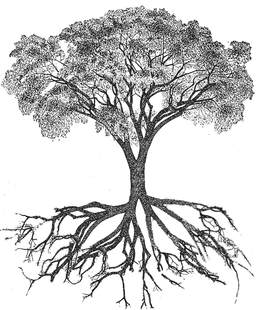 e live in a morass of myriad legacies—some footprints that cause us to stumble, some that prop us up. They engender our greatest and most regrettable moments. Consciously or not, we navigate our own lives along paths trodden by our forebears or diverging from them. I—we—cannot conceive of the matrix of legacies that inform our realities. It’s the nature of things. One event, one person, influences and alters the course of time and those living in it. We reintroduce the grey wolf to Yellowstone, and an entire ecosystem is altered—the trees are growing taller! The internet is invented, and the Arab Spring is in part organized in the cloud. Salk creates the polio vaccine, and generations are liberated from the affliction. John Barber’s 1791 development of the turbine led ultimately to the creation of the internal combustion engine, forever altering access to the globe and dramatically altering our climate. The Sumerians, a proto-literate civilization, ushered in epochs of sophisticated communication—the Bible, the Quran, Shakespeare, and JavaScript. A little-known poem by the Roman Lucretius, rediscovered after more than a millennium, inspired the Renaissance, the scientific method, and modernity. Think about that; we can trace the mechanisms and ethics of our current condition to a little know document that was almost insignificant ephemera consumed by time. Hemingway, in For Whom the Bell Tolls, reminds us that “Today is only one day in all the days that will ever be. But what will happen in all the other days that ever come can depend on what you do today.” Wow. Typical Hemingway, there aren’t any $25 words, and the prose is declarative and austere. But the observation resonates with critical importance if we’ll allow it. Hemingway, like so many keen observers, illuminates the obvious yet hidden truths. This is a commonplace yet critically important one. We endow each moment with as much significance as we choose to. But no matter what we do, or how intentionally we do it, we leave footprints that alter the terrain and the trajectory of the future. Who could’ve foreseen the turbine leading to climate change? Obscure Roman verse priming the world for humanism and the scientific method? Poets instruct us to rely on metaphors to explain the world with a figurative clarity and depth that resonates often more than objective truth. When we speak about human impact, the metaphor of the footprint is particularly elegant. We know intuitively what is meant because we have direct experiential knowledge of leaving our marks in the earth with every step. The imprint makes palpable the idea of influence; I literally alter the world around me. Every glance down reveals so much. We see where we’ve been. We project where we’ll go. We estimate our weight. We marvel at our footprints dancing with so many other. We note wandering, we see purpose. Here's another metaphor: roots, spreading unseen--stabilizing, enriching, communicating. Slowing down is tough. Eliminating distraction may be tougher. Without disparaging the modern world, it’s pace and clutter, one can reliably say that our reality is adverse to slow reflection. We know the benefits of meditation, mindfulness, contemplation, simplification, etc. They’re borne out by both science and common sense. I’d like to add another benefit (surely documented somewhere else; there’s my attribution!). When I stop to look and reflect, I’m inclined to understand more fully the nature of the world around me. I see a future tethered to events and people in the past. I see legacies shaping the zeitgeist. I see the footprints all around me and am emboldened that I have similar potential. And then anxiety! How difficult to be continuously thoughtful and deliberate. A student once remarked that to constantly be aware must be tough and exhausting. I told him that he’s right. Until it becomes a habit, a state-of-mind, then it is a chore. But once we widen our gazes or look a little more closely, we realize we can author reality. That what we say and do have a microscopic and macroscopic impact. Daunting, for sure, but empowering. And that gives me so much hope. Neo, once he sees the matrix for what it is, realizes his potential. I don’t know about bending spoons with the mind, but awareness awakens so many other superpowers. This year, I hope we awaken to those footprints and their gravity, train our own steps, cultivate some bravery, and leave a positive legacy. Niko Tsivourakis, Global Initiatives Director
0 Comments
Leave a Reply. |
AuthorThis blog is the collective voice of every person involved in the Global Initiative. Just as the globe hosts billions of disparate voices, we hope this space will embody and embrace the same diversity. Archives
July 2019
Categories |
 RSS Feed
RSS Feed
